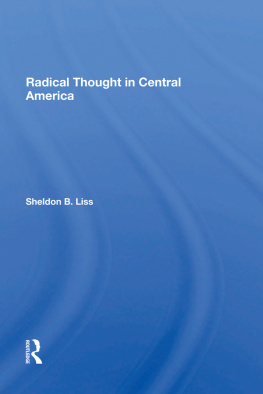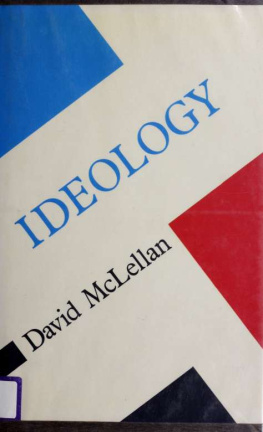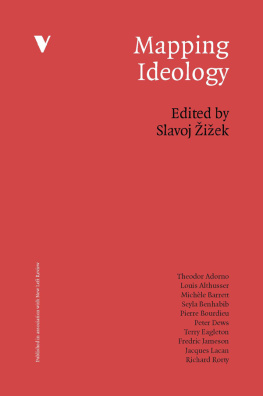ROUTLEDGE LIBRARY EDITIONS:
POLITICAL THOUGHT AND POLITICAL PHILOSOPHY
Volume 52
IDEOLOGY AND POLITICS
IDEOLOGY AND POLITICS
MARTIN SELIGER
First published in 1976 by George Allen & Unwin Ltd
This edition first published in 2020
by Routledge
2 Park Square, Milton Park, Abingdon, Oxon OX14 4RN
and by Routledge
52 Vanderbilt Avenue, New York, NY 10017
Routledge is an imprint of the Taylor & Francis Group, an informa business
1976 Martin Seliger
All rights reserved. No part of this book may be reprinted or reproduced or utilised in any form or by any electronic, mechanical, or other means, now known or hereafter invented, including photocopying and recording, or in any information storage or retrieval system, without permission in writing from the publishers.
Trademark notice: Product or corporate names may be trademarks or registered trademarks, and are used only for identification and explanation without intent to infringe.
British Library Cataloguing in Publication Data
A catalogue record for this book is available from the British Library
ISBN: 978-0-367-21961-1 (Set)
ISBN: 978-0-429-35434-2 (Set) (ebk)
ISBN: 978-0-367-24861-1 (Volume 52) (hbk)
ISBN: 978-0-429-28477-9 (Volume 52) (ebk)
Publishers Note
The publisher has gone to great lengths to ensure the quality of this reprint but points out that some imperfections in the original copies may be apparent.
Disclaimer
The publisher has made every effort to trace copyright holders and would welcome correspondence from those they have been unable to trace.
IDEOLOGY AND POLITICS
Martin Seliger
First published in 1976
This book is copyright under the Berne Convention. All rights are reserved. Apart from any fair dealing for the purpose of private study, research, criticism or review as permitted under the Copyright Act, 1956, no part of this publication may be reproduced, stored in a retrieval system, or transmitted, in any form or by any means, electronic, electrical, chemical, mechanical, optical, photocopying, recording or otherwise, without the prior permission of the copyright owner. Enquiries should be addressed to the publishers.
Martin Seliger 1976
ISBN 0 04 320109 1 Hardback
0 04 320110 5 Paperback
Printed in Great Britain
in 11 point Baskerville type
by Willmer Brothers Limited, Birkenhead
To the memory of my parents
and
The future of my grandchildren
Neta, Adi and Amir
The subject-matter of this book is explained in the Introduction and can be gauged from the detailed table of contents. What perhaps needs dispelling at the outset is a misapprehension to which the diagrams and scales in in particular might give rise. These are offered solely as visual illustrations in the main of the impact which strains and stresses arising in politically significant ideologies exercise upon them. Such visualization is of assistance to some people and for others complicates matters to the point of irritation, although even those prone to this reaction may here experience it only with regard to two over-crammed figures. These, as well as the other diagrams, may be disregarded, for they are only an explanatory device, and no substitute for explicit verbal argument.
The book has been long in the making and went through numerous drafts and two final revisions. Eventually, the exploration of the implications and tenability of the ideas I had formed issued in two books, in the main because of the unforeseen necessity to re-examine in some detail the theory of ideology of Marx and Engels and their immediate successors, a re-examination, most of which have been developed in extenso there and summarized in the other study; only in regard to a few issues is it the other way about.
In listing my acknowledgments of indebtedness, pride of place goes to the University of Manchester, which on the recommendation of its Department of Government elected me to a Simon Senior Fellowship for the academic year 19678, and extended it for a further term. During that period I lived at that comfortable haven for scholars, Broomcroft Hall, where I did most of the reading and worked out the general structure and basic argument of the book. I enjoyed the lively atmosphere of the Department of Government and, most of all, continuous contact with and soon the warm friendship of Professor Samuel E. Finer, since then the Gladstone Professor of Government and Public Administration, Oxford. A rough outline of what I had in mind formed part of a paper presented at the annual meeting at Chtillon in July 1967 of the International Institute of Political Philosophy (and from that time dates my dialogue, progressing from opposed to more compatible standpoints, with Professor Giovanni Sartori), but it was in Professor Finers staff-graduate seminar that the basic theses and framework elaborated in my Manchester manuscript were first outlined and discussed. I also wish to thank Professor Ghita Ionescu and the late Max Gluckman for submitting that manuscript to careful scrutiny, and Professor Brian Chapman for the interest he has shown in my work. Outside Manchester I am indebted to Professor David D. Raphael, and for detailed comments and for the discussion of a more expanded version to Professors Bernard Crick and Leonard Schapiro. To the latter I owe an unrepayable debt for reading, and commenting on, the full penultimate version of this work. His comments, like those of some other friends and colleagues, were not the less valuable for being in part inspired by the conception of ideology which this study tries to demonstrate as untenable.
* Marxist Conception of IdeologyA Critical Essay (International Studies Series, Cambridge U.P.).
Since the penultimate version, containing all parts, was completed in April 1973, and its revision bore only upon matters of form, not of substance, publications relevant to the subject of this study which have appeared since 1973 could be taken into account only in part.
I wish to record my gratitude to the following scholars who between 1967 and 1971 provided me with the opportunity of addressing staff or graduate seminars : Professors Kurt Sontheimer (at that time, in Berlin), Klaus von Beyme (Heidelberg), Michael Oakeshott (London), W. J. M. Mackenzie (Glasgow), Carl J. Friedrich (Harvard), Stuart Hampshire (Princeton), Robert E. Lane (Yale), Aaron Wildavsky (Berkeley), and Herbert Schambeck (Linz). I also had personal talks with these scholars, as well as with another old friend, Maurice Cranston of the London School of Economics, with Robert A. Dahl and Joseph LaPalombara (Yale), and Reinhard Bendix (Berkeley). In 1971 I enjoyed the privilege of addressing the British Political Studies Conference with Professor Dorothy Emmet in the chair. In addition to the scholars named, I should like to thank the participants in all discussions, including those in a staff-graduate seminar in my department at the Hebrew University, for making me aware, through their comments and questions, of the need for further clarification or elaboration. A far from negligible contribution in this
direction was made by the talented and dedicated graduate students who took part in my seminars on subjects related to various aspects of the present book.












